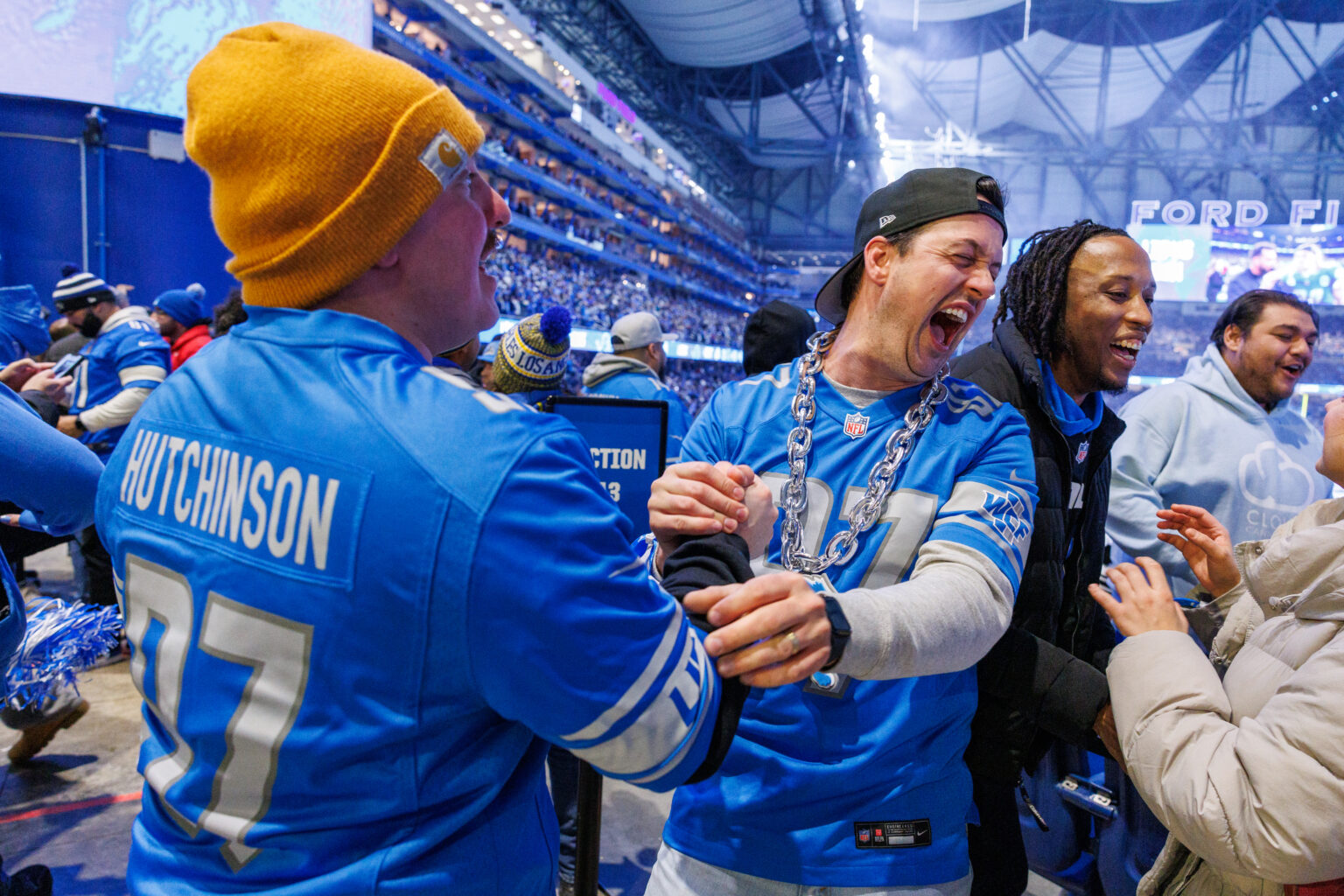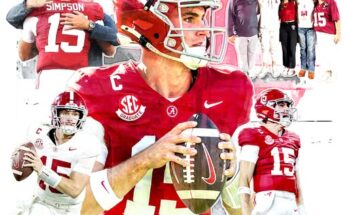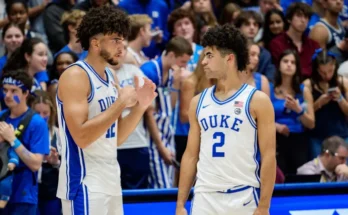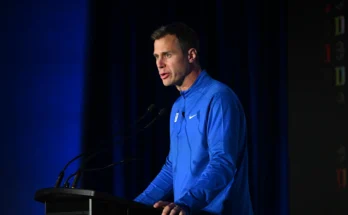From Lions to Lawmakers: How Die-Hard Sports Fandom Has Bled Into American Politics, Fueling Tribalism, Loyalty Wars, and a New Era of Partisan Identity
In the heart of American culture, few forces are as powerful, unifying, and at times polarizing as sports fandom. The passionate allegiance to teams, cities, and players has long defined regional identity, fostered community, and provided a common language for millions. But in recent years, that same zealous loyalty has taken on a different role—no longer confined to stadiums, fantasy leagues, or tailgate parties, it has crept into the very fabric of our political discourse. From Lions to lawmakers, the tribal instincts that drive fanbases have begun to mirror—and even shape—the way Americans engage with politics, policy, and public figures.
This convergence didn’t happen overnight. For decades, American politics and sports shared a flirtatious but relatively benign relationship. Presidents threw ceremonial first pitches, candidates posed in team jerseys to court local support, and Super Bowl interviews became a rite of passage for those seeking the Oval Office. Yet these interactions were largely symbolic, a way of tapping into the cultural zeitgeist without engaging in its emotional extremes. What has emerged in recent years, however, is far more complex—and in many ways, more troubling.
At the center of this cultural shift is the rise of identity-based politics. In the same way that a Detroit Lions fan clings to hope year after year despite heartbreak and futility, political partisans now remain fiercely loyal to their party or figurehead, regardless of policy failures or ethical controversies. Facts become negotiable, criticism is treated as betrayal, and the opposition is not merely wrong but evil—an enemy to be defeated rather than a viewpoint to be debated. The psychological mechanics of fandom—tribal belonging, emotional investment, us-versus-them narratives—have overtaken political rationality.
It is no coincidence that the language of sports has infiltrated political commentary. Politicians are now drafted, hyped, booed, and celebrated like MVP candidates. Election cycles are treated like playoff brackets, complete with underdog narratives, upset victories, and relentless media coverage that reduces complex issues to bite-sized entertainment. Even political debates resemble pre-game trash talk, where performance often matters more than substance. The media, always attuned to audience appetites, has adapted its coverage accordingly—emphasizing conflict over compromise, spectacle over nuance.
Social media has only accelerated this transformation. Much like a fan’s timeline during an NFL Sunday, political discourse on platforms like X (formerly Twitter), Facebook, and Instagram is saturated with memes, hot takes, and emotionally charged reactions. Algorithms reward outrage and loyalty, creating echo chambers that intensify partisanship and suppress dissent. In this environment, changing one’s political opinion—even in the face of overwhelming evidence—is as unthinkable as a die-hard Packers fan switching allegiance to the Bears. Politics has become personal, emotional, and performative—a stage upon which Americans act out their tribal identities with all the fervor of a rivalry game.
Nowhere is this phenomenon more visible than in the cults of personality surrounding political figures. Donald Trump’s presidency exemplified the fusion of sports fandom and political loyalty. To his supporters, Trump was not merely a politician but a team captain—a fighter, a winner, a symbol of defiance against a perceived establishment. His rallies had the feel of pep rallies, complete with chants, merchandise, and unwavering devotion. Criticism of Trump, no matter how valid or fact-based, was treated as sacrilege, akin to booing your own quarterback. And in response, his detractors adopted equally charged identities, turning resistance into its own form of team loyalty.
The same dynamics can be seen across the aisle. Figures like Alexandria Ocasio-Cortez or Bernie Sanders have cultivated devoted followings who rally behind slogans and symbols with the same intensity as sports fans waving team flags. The political arena has turned into a stadium, where cheering for your side and jeering the opposition matter more than advancing policy or solving problems. The scoreboard is no longer based on legislative success or governance but on how effectively one “owns” the other side in viral soundbites or social media skirmishes.
This fandom-driven political landscape has significant consequences. First and foremost, it undermines democratic deliberation. When loyalty trumps truth, and emotion overrides evidence, constructive dialogue becomes impossible. Compromise—once a cornerstone of governance—is now seen as weakness or betrayal. Legislators are incentivized not to reach across the aisle but to dig in deeper, to perform for their base rather than govern for the whole. The result is gridlock, dysfunction, and a deep erosion of public trust in institutions.
Moreover, the tribalism that defines both sports and politics leads to dangerous dehumanization. In sports, it’s common to vilify rival teams and their fans, but the consequences are limited to playful banter or, at worst, barroom brawls. In politics, however, this same dehumanization fosters real-world hostility, discrimination, and violence. When opponents are viewed as enemies rather than fellow citizens, democratic norms begin to crumble. We saw this play out in stark relief during the January 6th Capitol riot—a moment where political fanaticism exploded into mob violence, complete with flags, chants, and a terrifying sense of entitlement.
But all is not lost. Understanding how sports fandom has influenced politics also offers a pathway forward. If tribalism is inevitable, it can also be channeled for good. Just as sports teams can unite communities, promote civic pride, and inspire collective action, political identity can be harnessed to promote participation, accountability, and inclusivity. The key is to shift the focus from personalities to principles—from blind loyalty to shared values.
Media outlets can play a role by resisting the urge to frame politics as pure entertainment. Instead of covering elections like Super Bowls, they can emphasize policy analysis, historical context, and civic education. Social media platforms can adjust algorithms to reward constructive dialogue and factual information rather than outrage and division. Educational institutions can foster critical thinking and empathy, helping young Americans understand the difference between spirited debate and ideological warfare.
Perhaps most importantly, individuals can reflect on their own behavior. Are we engaging in political discussions to persuade, to learn, or simply to cheer for our side? Do we seek out information that challenges our views, or do we only consume content that confirms our biases? Are we treating those who disagree with us as rivals or as fellow citizens with different experiences and perspectives?
There is a rich irony in the current state of American politics. In a nation founded on the ideals of reason, debate, and compromise, we’ve embraced the emotional intensity of sports fandom as a political model. But unlike sports, where a new season offers a clean slate and the stakes are confined to the field, the consequences of political tribalism are enduring and far-reaching. The policies we debate affect real lives, the decisions we make at the ballot box shape the future, and the way we engage with each other defines the health of our democracy.
The path forward requires a recalibration—not a rejection of passion or identity, but a recognition of their limits. Passion should inspire action, not blind allegiance. Identity should foster community, not division. And fandom, while exhilarating in the stadium, must be tempered with responsibility in the halls of power. From Lions to lawmakers, the challenge is the same: how do we root for our team without losing sight of the bigger game?
As Americans navigate an increasingly polarized landscape, the lessons of fandom can serve as both cautionary tale and guiding light. Sports remind us of the joy of community, the thrill of competition, and the value of fair play. If those values can be reimagined in the political arena—if we can cheer for progress rather than personalities, celebrate diversity of thought rather than demonize difference—then perhaps the future of our democracy can be as inspiring as the best moments on the field.
In the end, the goal isn’t to eliminate passion from politics. It’s to direct that passion toward building, not breaking; uniting, not dividing. Politics, like sports, should challenge us to be better, not bitter. And if we can learn to approach our civic lives with the same discipline, humility, and respect we ask of athletes on game day, then maybe, just maybe, we’ll all come out winners.



